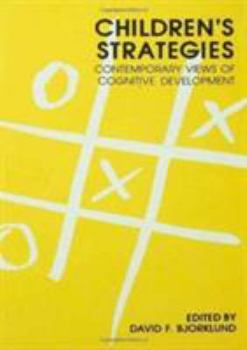Children's Strategies: Contemporary Views of Cognitive Development
Select Format
Select Condition 
Book Overview
One of the issues central to both classic and contemporary theories of cognitive development is children's goal-directed behavior, which is typically investigated in terms of strategies. This book brings together in one volume the latest research and theory regarding the development of children's strategies for a variety of cognitive tasks. Opening with a history of strategy development research and concluding with a chapter that integrates the diversity of ideas expressed by the contributors, Children's Strategies offers intervening chapters that examine strategy development for attention, analogical reasoning, mathematics, memory, reading, and problem solving in infancy. Although there is much common ground shared by the various contributors to this volume, there is no consensus concerning what exactly a strategy is. This mixture of consensus and disagreement reflects both the explosion of research in this area since the late 1960's and the complexity of the issues involved. It also reflects the fact that this is a topic that is very much alive in cognitive circles, one that will continue to stimulate research for years to come. The papers in this volume describe current research and theory concerning the development of children's strategies for handling a variety of cognitive tasks. After providing a historical view of the concept of strategies in cognitive development, the book highlights many of the issues of concern to contemporary developmental psychologists interested in strategies. The issues discussed include problem solving in infancy, memory, selective attention, mathematics, analogical reasoning, and reading.
Format:Hardcover
Language:English
ISBN:0805803157
ISBN13:9780805803150
Release Date:June 1990
Publisher:Psychology Press
Length:356 Pages
Weight:1.46 lbs.
Dimensions:1.1" x 6.5" x 9.2"
Related Subjects
PsychologyCustomer Reviews
0 rating





